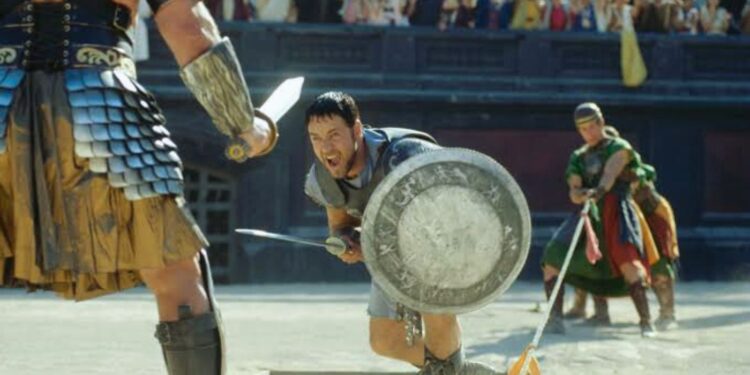Gladiator was based on several fictionalized Roman Empire histories, films, characters, and events. While it aimed to tell ancient Roman history beyond the popularized cliché represented in media for decades, director Ridley Scott and his writers had to improvise and settle for a script well-adapted for the big screen. Enticed by a copy of Jean-Léon Gérôme‘s 1872 painting, “Pollice Verso (Thumbs Down)”, Scott knew the film would focus on a gladiatorial arc.
By every standard, Scott’s Gladiator was a success. The epic historical drama easily grossed $503.2 million on a $103 million budget. Also, Gladiator received the highest number of nominations, with 12, at the 73rd Academy Awards. Yet, not many know a Gladiator name change probably saved the movie from failing.
How Maximus Earned His Name In Gladiator

When 25-year-old David Frazoni chose to drop out of school and, using his available time, traveled through Eastern Europe in 1972, he probably never foresaw the massive success his idea would become at the box office. Frazoni, impressed by the relics of gladiatorial arenas scattered across Eastern Europe, found inspiration for a script centered around a heroic gladiator. 25 years later, Steven Spielberg encouraged a 50-year-old Frazoni to write the script on the idea.
To help with his first draft, Frazoni read the Historia Augusta, an ancient Roman biography about Roman emperors, heirs, and usurpers. Frazoni’s first script draft was based on the life and times of Commodus. As such, Frazoni named his hero Narcissus, a Roman wrestler who killed Commodus by strangling him to death. When film director Ridley Scott read the script, he didn’t like Frazoni’s script prompt dialogues. Ridley Scott immediately hired John Logan to rewrite a significant part of the script, leading to the main protagonist’s name change from Narcissus to Maximus.
How Naming Maximus’ Character As Narcissus Could Have Affected Gladiator

Frazoni’s Narcissus character was based on the real historical events in the life of Commodus. Leaving Gladiator‘s protagonist as Narcissus would have limited the story and developmental arc of the character. Maximus Decimus Meridius, a fictional character in every sense, allowed Scott, Russell Crowe, and the film’s screenwriters to approach him with more creativity.
Several real-life and movie characters inspire Maximus. Notable examples are General Marcus Nonius Macrinus, an advisor to Marcus Aurelius, General Avidius Cassius, wrestler/gladiator Narcissus, and Spartacus. Each character brought unique traits that allowed Maximus to become, as Gladiator‘s Commodus summarizes, “The general who became a slave. The slave who became a gladiator. The gladiator who defied an emperor….”
Working with the name Narcissus would probably not have allowed John Logan to incorporate the death/murder of the character’s wife and son. It also would have made it difficult to deliver a perfect ending of an afterlife reunion, as shown in Gladiator. While there’s no doubting the creativity of the movie’s screenwriters, Gladiator‘s fictional Maximus did more for the movie’s success than a Narcissus story could have ever achieved.
 Follow Us
Follow Us




